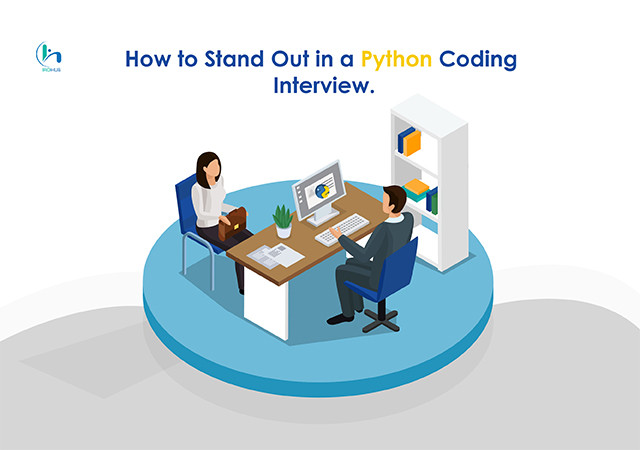Any coding interview is an examination that essentially concentrates on your professional skills and algorithm knowledge. However, if you require to stand out amidst the hundreds of candidates, you should comprehend how to use the standard functionalities of Python conveniently.
The variety of interviews you might encounter can be a doubtful coding difficulty, a whiteboard test, or a full day on-site interview. So if you can demonstrate your coding experiences at that instant, the job letter will contact you in no time. You may go over some of the top Python interview interrogations and solutions provided by experts which are classified into three levels- amateur, average, and exceptional. An absolute tradition of these problems and solutions on Python will unquestionably help you obtain your dream job as a Python Developer, Full Stack engineer, and other top profiles.
A Python coding interview is essentially a professional interview. They are not just about answering problems, they are further about how technically sound you are and how you can write decent prolific Python code. This will show your intensity of knowledge about Python and how you can practice Python’s built-in functions and libraries to execute your code. Let us look into some of the amazing built-in functions implemented by Python and how to choose the correct one, learn about the efficient use of data structures, how standard libraries in Python can be employed, and so on.
How to Choose the Right Built-in Function?
Python’s library of built-in functions is short as opposed to the standard library. The built-in functions are regularly available and are not required to be imported. It is recommended to learn each function before meeting for the interview. Till then, let us learn a few built-in functions and how to manage them, and also what options can be used.
Execute iteration with enumerate() instead of range()
Suppose a condition during a coding interview: You have a listing of elements and you have to repeat over the list with an introduction to both the indices and values, then use enumerate() instead of range().
Using List Comprehensions in area of the map() and filter()
Python helps list comprehensions that are more natural to read and are comparable in functionality as map() and filter(). This is one of the purposes why Guido van Rossum, the inventor of Python felt that dropping map() and filter() was considerably uncontroversial.
Debugging With breakpoint() instead of print()
Debugging is an indispensable part of writing software and it confers your knowledge of Python tools which will be beneficial in developing immediately in your job in a long way. However, using print() to debug a minute problem might be helpful originally but your code will grow cumbersome. On the different hand, if you use a debugger like a breakpoint(), it will forever act quicker than print().
Formatting Strings with the help of f-Strings
It can be complicated to know what type of string formatting should we accept since Python consists of different string formatting procedures. However, it is a great approach, and is recommended to use Python’s f-strings through a coding interview for Python 3.6 or higher.
Sorting Complex Lists with sorted()
There are a lot of interview problems that are regularly based on sorting and it is one of the various critical concepts you should be explicit about before you sit for a coding interview. Nevertheless, it is invariably a more suitable choice to use sorted() unless you are demanded to make your own sorting algorithm by the interviewer.
Efficient Use of Data Structures
Data Structures are one of the several essential concepts you should know before taking into an interview and if you prefer the complete data structure during interviewing circumstances, it will positively influence your performance. Python’s standard data structure implementations are amazingly convincing and give a bundle of default functionalities which will clearly be crucial in coding interviews.
Storing Values with Sets
Make use of sets alternatively of lists whenever you want to remove duplicate ingredients from the present dataset. Adding, changing, or recovering an item from a dictionary is one of the most fundamental tasks of programming and it is simple to perform with Python functionalities. However, developers often compare explicitly for values even if it's not required.
Taking Account of the Python Standard Library
Python’s functionalities are important on their own and all the information can be obtained just by using the import statement. If you know how to make good utilization of the standard library, it will increase your coding interview experiences.
Conclusion
Clearing interviews with courage and panache is an art. You might be a good programmer but it’s only a little part of the picture. You might miss clearing a few interviews, but if you develop a good method, it will absolutely help you in the long run. Being inspired is an imperative factor that will have a tremendous impact on your interview outcomes. In extension to that is preparation. Practice always supports. Brush up on all the current interview thoughts and then head off to exercising different interview questions. Interviewers also help through interviews if you can interact properly and communicate. Ask questions and regularly talk through brute-force and optimized resolution. Hope you have learned about most of the persuasive Python’s built-in functions, data structures, and conventional library packages that will support you in writing more reliable, more active, and cleaner code. Join our Python training in Kochi to gain more skills and knowledge.








Post Comments (0)